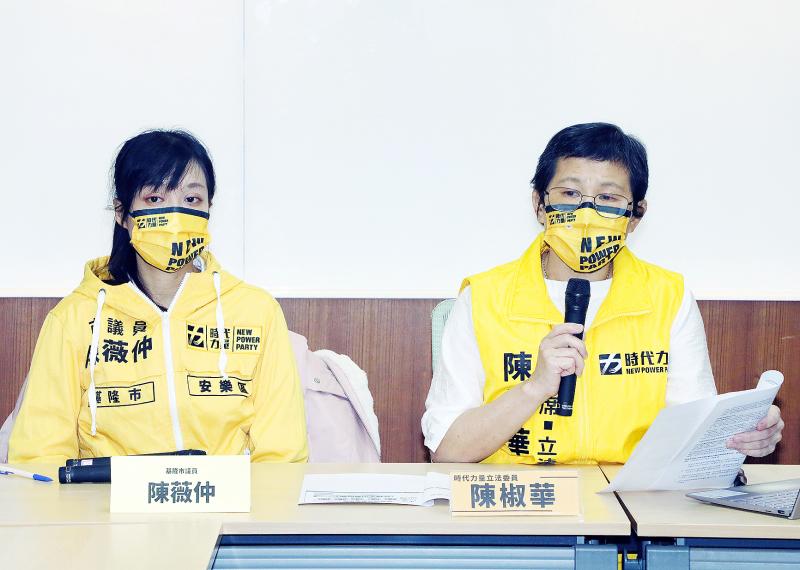Hospitals should offer an express emergency service for children as most of them are unvaccinated against COVID-19, New Power Party Chairwoman Chen Jiau-hua (陳椒華) said yesterday.
Chen was speaking at a news conference in Taipei as the government began its vaccination campaign for children aged six to 11.
A surge in COVID-19 cases has strained hospital capacity in Taipei, New Taipei City and Keelung, which have higher COVID-19 positivity rates than the national average of 9.63 percent. The situation has been worsened by people flocking to hospital emergency rooms for polymerase chain reaction (PCR) tests.

Photo: CNA
This has taken a toll on the quality of treatment received by all patients, particularly young children. Last week, a six-month-old infant who had a fever died after having waited for treatment in the emergency room of Linkou Chang Gung Memorial Hospital in New Taipei City for more than an hour.
Last month, a two-year-old boy in New Taipei City became the youngest person to die of COVID-19 in Taiwan. His family blamed the city government for its delayed response, which included passing the case between agencies and sending an ambulance too late.
These tragic incidents show that the government failed to inventory Taiwan’s medical resources in advance and set up measures to prevent a rise in COVID-19 cases from compromising healthcare service quality, Chen said.
“I have received complaints from many parents, who said they can clearly sense that hospitals are under a lot of strain,” she said. “In some cases, children must wait for a long time at emergency rooms to be treated, which can be a grueling task for the children and their parents. Children’s conditions could also worsen while waiting.”
“The Central Epidemic Command Center should consider refining the nation’s emergency medical system by providing express emergency services for children or urgent outpatient services. Hospitals should increase beds and wards for children,” Chen said.
To ease the burden on doctors in emergency rooms, the center should relax regulations by allowing nurses to administer PCR tests, she added.
As the government is implementing a “living with the virus” policy and may soon downgrade COVID-19 from a Category 5 epidemic disease to a Category 4, the country must do four things to reduce the COVID-19 death rate and prevent chaos, former Changhua Medical Alliance chairman Tsai Chih-hung (蔡志宏) said via videoconference.
For people aged 65 or older, the government must offer sufficient vaccines, as well as incentives for them to get vaccinated, he said, adding their vaccination rate must be elevated to 90 percent.
There should also be an adequate supply of vaccines for children, he said.
The self-testing rate would rise significantly if rapid test kits were readily available at a reasonable price, Tsai said.
“This would help identify asymptomatic cases, which would reduce the number of people taking PCR tests at hospitals or those undergoing home isolation,” he said.
The government should also prepare approximately 1.4 million to 3 million doses of COVID-19 pills for high-risk patients or those with mild symptoms, Tsai said.
The burden on the medical service would be greatly reduced if the nation had a well-rounded remote healthcare system, he added.
Fooyin University Hospital neurologist Chan Chin-chun (詹智鈞) said that blood oxygen machines should be provided to childcare facilities and to families with children who have contracted COVID-19, as infants have trouble expressing themselves and the machines monitor whether their blood-oxygen levels have dropped below 94 percent.

South Korean K-pop girl group Blackpink are to make Kaohsiung the first stop on their Asia tour when they perform at Kaohsiung National Stadium on Oct. 18 and 19, the event organizer said yesterday. The upcoming performances will also make Blackpink the first girl group ever to perform twice at the stadium. It will be the group’s third visit to Taiwan to stage a concert. The last time Blackpink held a concert in the city was in March 2023. Their first concert in Taiwan was on March 3, 2019, at NTSU Arena (Linkou Arena). The group’s 2022-2023 “Born Pink” tour set a

CPBL players, cheerleaders and officials pose at a news conference in Taipei yesterday announcing the upcoming All-Star Game. This year’s CPBL All-Star Weekend is to be held at the Taipei Dome on July 19 and 20.

The Taiwan High Court yesterday upheld a lower court’s decision that ruled in favor of former president Tsai Ing-wen (蔡英文) regarding the legitimacy of her doctoral degree. The issue surrounding Tsai’s academic credentials was raised by former political talk show host Dennis Peng (彭文正) in a Facebook post in June 2019, when Tsai was seeking re-election. Peng has repeatedly accused Tsai of never completing her doctoral dissertation to get a doctoral degree in law from the London School of Economics and Political Science (LSE) in 1984. He subsequently filed a declaratory action charging that

The Hualien Branch of the High Court today sentenced the main suspect in the 2021 fatal derailment of the Taroko Express to 12 years and six months in jail in the second trial of the suspect for his role in Taiwan’s deadliest train crash. Lee Yi-hsiang (李義祥), the driver of a crane truck that fell onto the tracks and which the the Taiwan Railways Administration's (TRA) train crashed into in an accident that killed 49 people and injured 200, was sentenced to seven years and 10 months in the first trial by the Hualien District Court in 2022. Hoa Van Hao, a